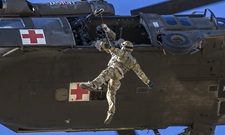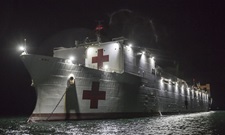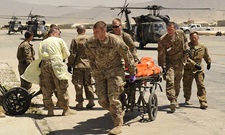The Military Health System is led by office of the Assistant Secretary of Defense for Health Affairs under the Office of the Undersecretary of Defense for Personnel and Readiness, and is comprised of the following elements...
Office of the Assistant Secretary of Defense for Health Affairs
Leading the MHS, is the Office of the Assistant Secretary of Defense for Health Affairs (OASD[HA]). The ASD(HA) is a civilian, Senate-confirmed official who serves as the chief medical adviser to the Secretary of Defense and oversees health policy and budgeting across the system, as well as directing the activities of the Defense Health Agency. The ASD(HA) is supported by the Principal Deputy Assistant Secretary of Defense for Health Affairs and three Deputy Assistant Secretaries of Defense.
Joint Staff Surgeon
The Joint Staff Surgeon is the chief medical adviser to the Chairman of the Joint Chiefs of Staff, providing advice to the Chairman, the Joint Staff, and the Combatant Commanders, coordinating all issues related to Health Services to include operational medicine, force health protection, and readiness among the Combatant Commands, the Office of the Secretary of Defense, and the Services. | Read more about the Joint Staff Surgeon, Brig. Gen. John R. Andrus
Defense Health Agency
Established in 2013, the Defense Health Agency (DHA) is a combat support agency (like the Defense Intelligence Agency and Defense Logistics Agency, for example) that provides a host of shared health services across the MHS, from operating the TRICARE health benefit to providing pharmacy and medical logistics, performing medical research and development and operating health information technology systems, with a goal of providing integrated and efficient service to the joint force.
Uniformed Services University of the Health Sciences
The Uniformed Services University of the Health Sciences (USU) is the nation’s federal health professions academy — akin to the undergraduate programs of the U.S. military academies at West Point, Annapolis and Colorado Springs. And like the academies, students are not charged tuition; they repay the nation for their education through service.
In many respects, USU’s curricula and educational experiences are similar to those of civilian academic health centers, with one important difference: its emphasis on military health care, leadership, readiness and public health set USU apart.
Military Hospitals and Clinics
Military hospitals and clinics are the heart of military medicine, where military, civilian and contract personnel provide care for TRICARE beneficiaries and gain the skills and training to support operational units.
With military hospitals and clinics located on military installations around the world, the MHS is one of the nation's largest health systems – it operates more hospitals than any nonprofit hospital system in the nation, and would rank among the top five for-profit systems. | See Current Stats
Looking for a Military Hospital or Clinic?
Expeditionary Care
Army, Navy and Air Force medical professionals help ensure those in uniform are medically ready to deploy anywhere around the globe on a moment's notice. And these medical professionals are also ready to go with them. There isn't another military medical force like it in the world—with the expertise, the assets and the global reach of our health system.



TRICARE
Operated by the Defense Health Agency, TRICARE is designed to provide the integrated, high quality care that millions of military families, past and present, deserve. As such, it offers one of the most comprehensive and affordable health benefits available to any American. Integrated health care is offered through military treatment facilities and through networks of civilian providers operated by civilian managed care support contractors in the United States and abroad. With 9.6 million beneficiaries, TRICARE would rank, if it was a civilian health insurer, among the 10 largest health plans in the nation. | Read more about the TRICARE health plan.